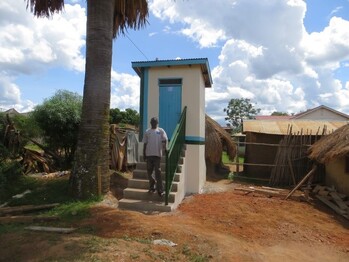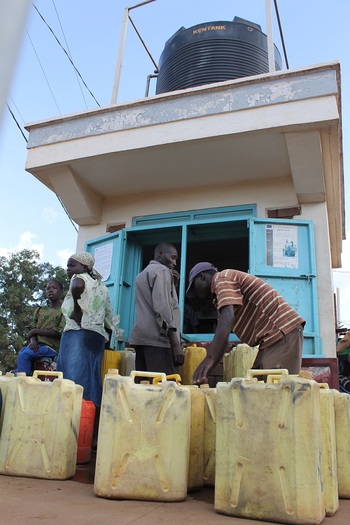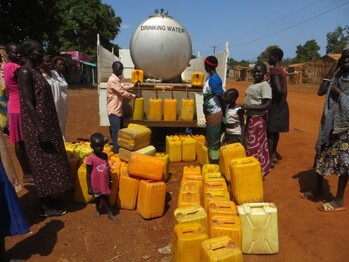Development of the Urban Water and Sanitation Sector
Project description
Title: Development of the Urban Water and Sanitation Sector in South Sudan
Commissioned by: German Federal Ministry for Economic Cooperation and Development (BMZ)
Country: South Sudan
Overall term: 2017 to 2020

Context
Decades of civil war have hampered development of the water infrastructure in South Sudan. Investments have not been made, over half of the population has no access to clean drinking water, and even fewer people have access to adequate sanitation. The latest conflict (since July 2016) has further exacerbated the situation for the population, especially for more than 2 million internally displaced persons and their host communities.
The water supply and sanitation sector lacks the institutional framework for sustainable development. There is a serious shortage of qualified personnel and know-how at all levels, from the water utilities to the responsible administrative bodies and ministries. Most of the population has to resort to using untreated water from rivers, wells and springs.

Objective
Conflict-affected internally displaced persons and the populations in host communities have better access to drinking water, sanitation and hygiene measures.

Approach
GIZ helps maintain the operation of drinking water and sanitation facilities in the cities of Torit, Yambio and Yei. The project adopts a pro-poor approach and aims to secure affordable water and sanitation for the population.
To this end, the project follows up on previous phases. It has, for example, advised the Ministry of Water and Irrigation on drafting legislation that creates a comprehensive legal framework for the institutional reform of the water sector, and on investment planning. It has also supported partner institutions in framing initial regulatory instruments. The project has assisted in establishing public water utilities, paving the way for investments by KfW Development Bank in the water supply and sanitation infrastructure. This was carried out under a consultancy contract with the GFA Consulting Group and in close cooperation with the local authorities. Until December 2014, the Agence Française de Développement (AFD) supported additional activities as part of a cofinancing arrangement.
In response to developments since July 2016 and recurrent cholera epidemics, measures have been stepped up and extended to maintain the drinking water supply in particular. The project continues to provide water utilities with financial support and technical assistance for operation of the water supply and sanitation infrastructure. This assures the basic supply to the majority of the population through the sale of clean water by water kiosks at affordable prices.
Major foundations have therefore been laid for improved hygiene and sanitation in households and schools to reduce the incidence of water-borne diseases. Even hygienically safe water from water kiosks is frequently contaminated during transport or storage in households. Trained women, called safe water champions, spread know-how and provide instruction on the proper handling of water and on sanitation and hygiene practices. With support from the non-governmental organisation AMREF, 280 women are currently being selected and trained as multipliers. Health care centres are also being assisted in monitoring diarrhoea and cholera.
GIZ designs schemes for improved hygiene and sanitation at selected schools in the project cities. Building measures are then planned in the schools, e.g. the repair or construction of toilets, primarily composting latrines, and hand-washing stations. Where possible, school gardens are created where the compost produced can be put to use. These gardens can also be used for learning purposes, contributing to school meals or financing the purchase of soap through the sale of produce. Simple preventive measures are also integrated into everyday school life, group hand-washing with soap and regular cleaning of sanitary facilities, for example.
Results
At least 50,000 people have benefited from access to safe drinking water. Three water utilities have been established and personnel trained in the operation and maintenance of facilities. Preparations have been made for investments by KfW Development Bank in the three cities. The operator model introduced by GIZ has been recognised by the Ministry of Water and Irrigation as a model for reform.
The urban population has been made aware of the importance of hygiene and how to handle drinking water. Since 2013, hygiene measures have reached 15,000 schoolchildren and teachers and more than 6,600 households, and about 4,000 people now have access to improved sanitation in Juba and Yei.
National water legislation has been awaiting ratification since 2013. A strategy for the urban water supply and sanitation and an investment plan for the sector were also published in 2013. Major steps have therefore been taken towards institutional reform in the water sector.